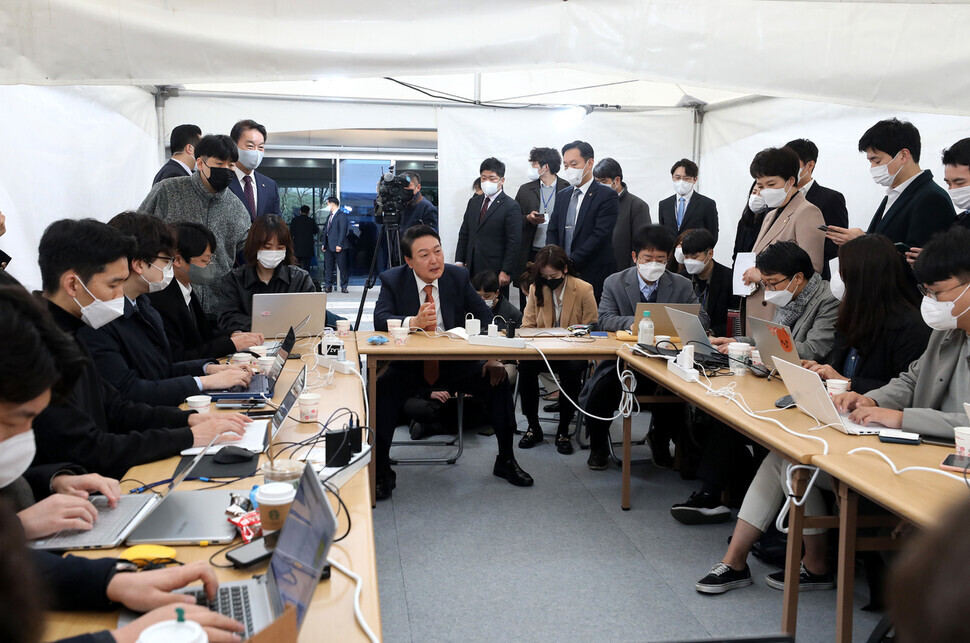hankyoreh
Links to other country sites 다른 나라 사이트 링크
S. Korea’s outgoing, incoming administrations lock horns over prosecutorial reforms

The transition committee for President-elect Yoon Suk-yeol abruptly canceled a Ministry of Justice (MOJ) policy briefing scheduled for Thursday morning over issues with Minister of Justice Park Beom-kye, who has stated his objections to Yoon’s pledges concerning the prosecutors’ organization.
Analysts said the situation shows an escalation in the clash that had erupted between the incoming and outgoing administrations over matters including Yoon’s plan to relocate the presidential office and the appointment of a new governor for the Bank of Korea (BOK).
Members of the transition committee’s political, judicial and administrative subcommittees held a press conference at the committee’s offices in Seoul’s Tongui neighborhood at 9 am on Thursday to announce they had notified the MOJ of the briefing’s postponement.
“This behavior of directly opposing the pledge of a president-elect chosen by the people is disrespectful, and we cannot conceal our anger over it,” they declared.
Meeting with reporters the day before, Park had declared his opposition to Yoon’s pledge to abolish the Justice Minister’s authority to direct investigations.
“We still need democratic controls on the prosecutors,” he insisted. He also maintained that Yoon’s pledges concerning the prosecutors’ authority to independently establish their own budget was a “matter for legislation.”
The transition committee said it would ask for the policy briefing to be revised for a report to be delivered before March 29. A Supreme Prosecutors’ Office (SPO) operations briefing, which expressed approval for Yoon’s pledge, went ahead the same day.
People Power Party (PPP) lawmaker and transition committee member Yoo Sang-bum, a former prosecutor, said the briefing’s postponement “was the decision of the transition committee and had nothing to do with President-elect Yoon’s intentions.”
Park had expressed his objections to Yoon’s pledges on several occasions since the election, and the transition committee had officially stated the day before that it would receive the policy briefing separately from the SPO, citing the “opposing position of the Minister of Justice.”
Analysts suggested that Yoon was behind the committee abruptly bringing the issue up again, since Yoon had clashed with the Blue House the day before over matters including the appointment of a new BOK governor.
One precipitating factor appears to have been the Democratic Party’s announcement that it plans to put the finishing touches on prosecutorial reforms — including the complete removal of the prosecutors’ authority over investigations — before the Yoon administration takes office. The Democratic Party is currently preparing to elect its floor leader.
“For this administration, ‘prosecutorial reforms’ are meant to uphold the prosecutors’ neutrality,” Yoon said while speaking with reporters.
“Are they admitting that this hasn’t happened after five years of trying?” he asked.
He went on to say that it “contributes more to neutrality to give [the prosecutors] independent powers.”
“There is no real need for the Minister [of Justice] to have the authority to direct investigations,” he added, reaffirming his intent to honor his pledge.
Some are suggesting that Park has acted inappropriately in light of the precedent of government offices giving policy briefings that align with the new administration’s policies. Transition committees, for their part, have usually held roundtables and organized task forces to bridge differences with the outgoing administration on policies and basic goals — rather than refusing outright to hold policy briefings.
In addition to the parts of the report about prosecutors’ authority that the transition committee want revised, the MOJ’s policy briefing also includes other important areas related to welfare and security, including crime prevention policies, women’s and children’s rights, and matters related to corrections and immigration. In effect, those bread-and-butter issues are taking a backseat to beefing up prosecutorial powers.
While leaving work on Thursday, Park was asked by reporters whether he had revised the policy briefing.
“There have been no particular changes,” he replied.
By Kim Nam-il and Oh Yeon Seo, staff reporters
Please direct questions or comments to [english@hani.co.kr]
Editorial・opinion
![[Correspondent’s column] The real reason the US is worried about Chinese ‘overcapacity’ [Correspondent’s column] The real reason the US is worried about Chinese ‘overcapacity’](https://flexible.img.hani.co.kr/flexible/normal/500/300/imgdb/original/2024/0510/5217153290112576.jpg) [Correspondent’s column] The real reason the US is worried about Chinese ‘overcapacity’
[Correspondent’s column] The real reason the US is worried about Chinese ‘overcapacity’![[Editorial] Yoon’s gesture at communication only highlights his reluctance to change [Editorial] Yoon’s gesture at communication only highlights his reluctance to change](https://flexible.img.hani.co.kr/flexible/normal/500/300/imgdb/original/2024/0510/7717153284590168.jpg) [Editorial] Yoon’s gesture at communication only highlights his reluctance to change
[Editorial] Yoon’s gesture at communication only highlights his reluctance to change- [Editorial] Perilous stakes of Trump’s rhetoric around US troop pullout from Korea
- [Guest essay] Preventing Korean Peninsula from becoming front line of new cold war
- [Column] The state is back — but is it in business?
- [Column] Life on our Trisolaris
- [Editorial] Penalties for airing allegations against Korea’s first lady endanger free press
- [Editorial] Yoon must halt procurement of SM-3 interceptor missiles
- [Guest essay] Maybe Korea’s rapid population decline is an opportunity, not a crisis
- [Column] Can Yoon steer diplomacy with Russia, China back on track?
Most viewed articles
- 1[Correspondent’s column] The real reason the US is worried about Chinese ‘overcapacity’
- 2Behind bellicose bluster, N. Korea is turning airfields into greenhouse farms
- 3[Book review] Who said Asians can’t make some good trouble?
- 4‘We must say no’: Seoul defense chief on Korean, USFK involvement in hypothetical Taiwan crisis
- 5Presidential office warns of veto in response to opposition passing special counsel probe act
- 6With Naver’s inside director at Line gone, buyout negotiations appear to be well underway
- 7[Editorial] Yoon’s gesture at communication only highlights his reluctance to change
- 8Yoon voices ‘trust’ in Japanese counterpart, says alliance with US won’t change
- 9Yoon rejects calls for special counsel probes into Marine’s death, first lady in long-awaited presse
- 10How S. Korea’s Yoon flushed 30 years of ties with Russia down the drain